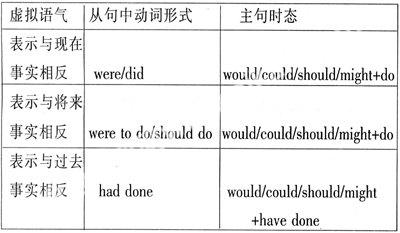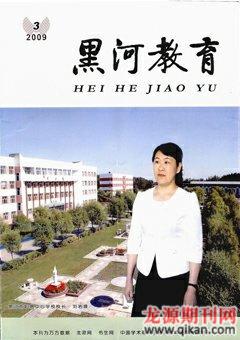浅谈虚拟语气的用法
朱 佳
语气是动词的一种形式,表示说话人对发生的动作或所处的状态所表现出的态度和看法。英语中有三种语气,即陈述语气、祈使语气和虚拟语气。虚拟语气在英语中较常见,表示人的主观愿望、建议或与事实相反的假设之意,是高中英语语法学习的重点和难点。下面试对虚拟语气的一些用法作以介绍。
1.虚拟语气用在If引导的条件状语从句中,其主句、从句的时态如下:

例句: ①If I were you,I would help you.
② If you were to come tomorrow,I would giveyoua book.
③ Ifhe had studied hard ,he would have succeeded.
这里需要强调的是:首先,当条件状语从句的谓语中含有助动词had, should或were时,有时可省略从句中的if,然后将had, should或were移到主语之前。如上面句②可变为:Were you to come tomorrow,I would give you a book.或者可以表达为:Should you come tomorrow, I would give him a book. 句③可变为:Had he worked hard , he would have succeeded.
其次,如果主句和从句所描述的动作不是同时发生,其动词的形式要根据动作所发生的时间而定,所用的虚拟语气要用混合虚拟语气。如:If it had rained last night , it would be very cold today.
第三,含蓄虚拟条件句即不用条件句而是用介词短语等来表示假设情况的虚拟语气的用法。如:Without him ,the question couldnt have been solved in a short time.
2.虚拟语气用在wish引导的宾语从句中,其动词形式如下:

例句:① I wish I were you.
② I wish it would rain tomorrow.
③He wished he hadnt done it.
3.虚拟语气用在as if/though引导的状语从句或表语从句中,意为“好像”。
例句:①She loved the child as if he were her own.(方式状语从句,表示与现在事实相反)
②It looked as if he hadnt cheated in the exam.(表语从句,表示与过去事实相反)
4.虚拟语气用在It′stime 引导的从句中,意为“该是做什么的时候了”。
例句:①It is the first time I went there.
②It is time you watchedTV.
5.虚拟语气用在would rather, would sooner等引导的从句中, 动词采用过去式或过去完成式,意为“宁愿做什么”。
例句:①I would rather he came tomorrow than today.
I would just as soon you had returned the book yesterday.
6.虚拟语气用在 insist 和 suggest 引导的宾语从句中,表示建议、要求或命令之意。
例句: ①She insisted that she had read thatbook.
②The smile on his face suggested that he had passed the exam.
总之,虚拟语气的用法并非没有规律可循,只要学生掌握了其正确的表达方法,注意主句、从句的时态呼应,就能在考试中做到万无一失。
责任编辑付淑霞)

